Nurses are responsible for promoting good health, preventing diseases, and helping patients cope with various illnesses. Though they work collaboratively on a routine basis, nurses do not just “assist” physicians and other health care providers. They also practice independently within their respective scope of practice. Nursing roles cover direct patient care to case management, working out nursing practice standards, establishing quality assurance methods, and leading complex nursing care systems.
Nursing has provided a broad range of career opportunities, like that of the entry-level practitioner to doctoral-level researcher.
Nurses are also considered as professionals who do hands-on, personalized patient care. Nurses have been in demand in terms of employment for the past years, and its employment rate has been projected to increase until 2026, which is more rapid compared to other professions. They have a broad scope of practice and may work independently or collaborate with other people working in the health care industry to provide professional patient care.
Nurses have been regarded as advocates for their respective patients and their patients’ families. They are also responsible for developing and managing nursing care plans along with proper instruction. They also serve as educators who aid communities by teaching them to take on steps towards the improvement or maintenance of their health.
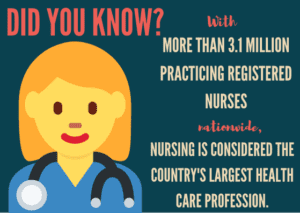
Even though an entry-level nurse can still be accepted in a job with a three-year RN degree, there has been a growing national movement that requires all nurses to hold a Bachelor of Science in Nursing (BSN) degree. There has been a large number of nursing schools offering accelerated bachelor’s and master’s degree programs. More options can be found for RN-to-Master of Science in Nursing (MSN) and MSN-to-doctoral programs, ideal for highly competent nurses in the workforce.
A professional nurse may also focus on a certain specialization. There are several specializations to choose from, and each of which has specific certification or completion requirements as well as related professional network or organization.
See also: 25 Great Study Hacks for Nursing Students
Below is a general guide on nursing as a degree along with pertinent information on nursing statistics, career pathways, job outlook, types of nursing degrees, and its specializations. The similarities and differences between a traditional and online nursing degree shall be explained as well.
QUICK LINKS TO RESOURCES ON THIS PAGE:
- Nursing as a Degree
- Types of Nursing Degrees
- Nursing Specializations
- Online vs. Brick and Mortar Nursing Degrees
- Nursing Career Pathways, Information, and Outlook
- 10 Common Nurse Occupations
- Other Nurse Occupation Titles
- 30 Highest Paying Nursing Careers
- Gerontological Nurse Practitioner – Annual Salary $173,133
- Certified Registered Nurse Anesthetist (CRNA) – Annual Salary $153,891
- Chief Nursing Officer – Annual Salary $136,350
- Nurse Practitioner – Annual Salary $113,930
- Nursing Home Administrator – Annual Salary $107,987
- Certified Nurse Midwife – Annual Salary $107,978
- Pain Management Nurse – Annual Salary $104,000
- Neonatal Intensive Care Unit Nurse – Annual Salary $102,357
- Mental Health Nurse Practitioner – Annual Salary $101,969
- Psychiatric Mental Health Nurse Practitioner – Annual Salary $101,930
- 10 Unique Nursing Careers
- Top Travel Nurse Careers
- Nursing Schools, Degrees, and Rankings
Nursing as a Degree

Nursing is considered the country’s largest health care professional as it has greater than 3.1 million registered nurses practicing nationwide. Students earning a Nursing degree make up more than half of the population with an inclination toward the health profession. Even though it has a large population, more nurses are needed in the future to fulfill the increasing demand for nursing care.
Though 62.2% of all employed RNs work in hospitals, most of them are employed in a broad range of other settings. These include private practices, primary care clinics, home health care, surgicenters, health maintenance organizations, nursing centers, insurance and managed care organizations, nursing homes, hospices, public health agencies, schools, mental health facilities, and the military. Other nurses maintain careers as university or college educators who prepare future nurses or scientists to develop advancements in health care.
Because of increasing opportunities, the pursuit of RNs for the BSN degree is rising. In 1980, about 55% of registered nurses carried a hospital diploma as their highest educational credential, 22% earned a bachelor’s degree, and 18% earned an associate degree, based on statistics from the Federal Division of Nursing. In 2008, a diploma was regarded as the highest educational credential for 13.9% of RNs, while that for the bachelor’s degrees has increased to 36.8%, with 36.1% carrying an associate degree. Moreover, 13.2% of the current nursing workforce are holders of masters or doctoral degrees.
Based on a report from the Health Resources and Services Administration in July 2002, an associate degree in nursing graduates is gradually decreasing at a higher rate compared to bachelor’s degree graduates, with the net result that bachelor’s degree graduates make up a greater share of total graduates. This report demonstrates the huge emphasis that nurses place on advanced education in the present growing market and the employers’ demand for RNs who hold a bachelor’s degree.
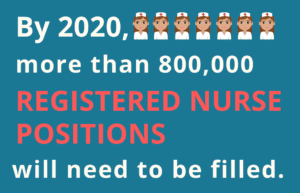
Federal figures show a projection that if present trends continue, the shortage for RNs will rapidly accelerate in the next two decades. By the year 2020, more than 800,000 RN positions are expected to be unfilled. This is based from the National Center for Workforce Analysis an agency of the U.S. Department of Health and Human Services. Nevertheless, a large number of markets, hospitals and employers struggle to meet the increasing demand for RN care.
The trends in the hiring of RNs are dictated by factors such as the increasing health care needs of a large number of elderly, a growing population of hospitalized elderly, patients who suffer from acute illnesses, the expansion of front-line primary care in the community; technological advancement and an aging RN workforce. In 2008, the median age of working RNs was 47.0, which is considerably better than 40 in 1980. Though hiring of RNs steadily increases in cities, the present demand differs in every region, every market, in contrast to the nationwide shortage of RNs which occurred in the late 1980s.
Meanwhile, the average annual earnings of employed RNs was $60,970 in 2007, based on the Federal Bureau of Labor Statistics
FAQ: Is a nursing degree the right choice for me?
Types of Nursing Degrees
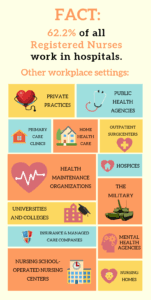
The following shows relevant information regarding the different levels of nursing degrees:
Entry Level
One of the most significant things to understand as an entry level nursing student is that the NCLEX-RN examination needs to be passed, no matter what type of degree is earned.
Below are the three most common alternatives for entry-level training below the bachelor’s level:
- Diploma in Nursing- generally defined as two to three-year hospital-based training programs
- Associate Degree in Nursing (ADN)- defined as 18 months to two-year college programs
- Licensed Practical Nurse (LPN)- defined as a one-year certificate or diploma college programs
Bridge programs enabling ADN-educated registered nurses (RNs) to obtain a bachelor’s and master’s degree simultaneously have been available for RNs who are interested in pursuing advanced nursing practice. Such bridge programs allow a short amount of time only to earn every degree separately.
LPN or LVN Education Degree
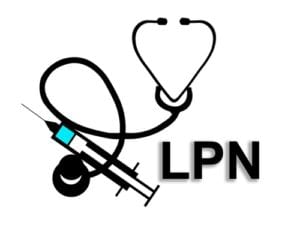
Licensed Practical Nursing (LPN) or Licensed Vocational Nursing (LVN) programs have the fastest duration of completion since it only takes about one year. Training can be received in a local hospital, community college, or vocational-technical school. LPN or LVN programs are regarded as a convenient alternative for students who are juggling work and family obligations. Some courses can be taken online, allowing busy students to learn at their most comfortable pace.
Given that the program is fast-paced, students are expected to become knowledgeable and be well-prepared for their first nursing job. The completion of an LPN or LVN makes one qualified for licensure after passing the state-administered nursing exam or NCLEX-PN.
LPN-to-Associates Degree

The LPN-to-Associates (ADN) bridge programs are directed towards students interested in becoming an entry-level RN. Students need to take multiple liberal arts courses. There are schools though that offer online, hybrid programs, allowing students to study at a comfortable pace. Nevertheless, schedules need to be fixed for clinical practice in local medical facilities. The ADN serves as a bridge towards a bachelor’s degree for students who wish to continue their education. There are also employers who give tuition reimbursements to LPNs who want to become an RN.
Associate of Science in Nursing (ADN)

The most common approach towards becoming an RN aside from passing the NCLEX exam is to obtain an Associate of Science in Nursing (ADN) degree. This degree concentrates more on technical skills rather than concepts, and this serves as the stepping stone of at least 30% of graduates towards pursuing a BSN. This is recommended as an alternative if you have not yet worked as an LPN or LVN and want to advance your career as an RN sooner than a BSN program which takes about four years. Moreover, institutional commitment is lesser than a full bachelor’s degree, and money can be earned after 1.5 to 2 years in school. Still, graduates may consider pursuing a BSN later on.
The degree program can be completed in 18 to 24 months in an accredited nursing school, vocational school, or community college. Night or weekend classes are also available for those busy with work and family matters.
SEE: Best Online Schools for Associates in Nursing
LPN-to-BSN

LPN-to-BSN bridge programs consider LPN work experience, rather than a conventional four-year BSN pathway. A liberal arts education shall be provided, and once the entire program is completed, graduates become qualified to work as an RN. This bridge program is ideal for those who want to manage other nurses, since an RN with a BSN degree has more considerable advantages compared to an ADN in terms of salary. This program is also designed for those who plan on pursuing a higher degree in the future.
Classes can be attended part-time, yet completion of the degree takes about four academic semesters, given full-time study. For those working in a school, the workload must be considered since this type of program is deemed more rigorous and detailed compared to other LPN bridge programs.
Bachelor’s Degree
The bachelor’s degree is considered an excellent alternative for aspiring or current nurses who desire career advancement. Nurses with a bachelor’s degree become qualified for more nursing opportunities than nurses with an ADN. According to job market studies, eligibility for more of the available nursing jobs is higher by 88% with those carrying a BSN but decreases to 37% with those who have earned an ADN.
Though the BSN is considered a four-year degree that blends classroom learning with clinical training, there are a few BSN programs that enable you to earn the degree in a lesser amount of time considering that you are already an RN with an ADN or diploma.

Many BSN alternatives are accessible for nurses at various phases of their respective careers:
Bachelor of Science in Nursing (BSN) (pre-licensure for those who want to practice with a BSN)
LPN to BSN (enables LPNs to earn a BSN in only four semesters)
RN to BSN (post-licensure degree for ADN and diploma holders who want to make a BSN) – The RN-to-BSN is a bridge program ideal for registered nurse graduates of the associate degree or diploma programs who want to finish their BSN degree. Instead of completing a full BSN program from the beginning, RNs may save time and money through this pathway. This bridge program gives credit for nursing skills which were acquired through school or work experience and takes about two years to complete.
The RN-to-BSN program is normally available on a flexible schedule ideal for meeting the needs of working nurses. Several schools have multiple start dates throughout the whole year, instead of starting the program in September. The completion of an RN-to-BSN program opens opportunities for higher wages and supervisory positions. It is also designed for those planning to pursue a master’s degree in the future.
Second Degree BSN – are ideal for non-nurses who have earned a BSN in non-nursing fields. These programs will provide credit once the liberal arts requirements have been completed. A second-degree BSN takes typically two academic years or less because liberal arts credits from the bachelor’s degree shall be taken into consideration. Clinical rotations may be done in local communities. Accelerated BSN, on the other hand, can be completed in 12 to 20 months. A second-degree BSN entitles you to be able to take the national licensure exam after graduation.
SEE: Top 20 Online Bachelor of Science in Nursing Degree Programs
Master’s Degree
An excellent alternative for maximizing your career potential in the field of nursing is through earning a Master of Science in Nursing (MSN), which will lead you to become a nurse practitioner. Based on the US Government Statistics, 94% of active nurse practitioners are MSN degree graduates and earn an annual salary of approximately $82,000. Earning an MSN is required if you wish to work in advanced practice nursing as a clinical nurse specialist, midwife or nurse anesthetist, and nurse practitioner. There are MSN programs also that offer a specialized track or concentrate in a specific nursing specialization like oncology or pediatrics.

Those carrying an ADN degree or nursing diploma and wish to earn a graduate degree should enroll in an RN-to-MSN bridge program with no BSN requirements. These can be classified as direct entry MSN programs, graduate entry or master’s entry programs, which are ideal for non-nurses carrying a bachelor’s degree in another field. Generally, RN-to-MSN bridge programs are available for the whole year and have multiple start dates. These programs blend RN licensure preparation with advanced training in a master’s specialization. Direct entry MSN programs require three years for completion, and the first year focuses more on entry-level nursing courses while the last two years are devoted to graduate level study.
The various types of MSN programs are:
- Direct Entry MSN (for non-nurses carrying a bachelor’s in another field)
- RN to MSN (for RNs with an associate degree or diploma)
- MSN- Nurse Practitioner (NP)
- MSN- Clinical Nurse Specialist (CNS)
- MSN- Clinical Nurse Leader
- MSN- Certified Nurse Midwife (CNM)
- MSN- Certified registered nurse anesthetists (CRNA)
It has been reported that at least 95% of nurse practitioners holding an MSN are involved in clinical practice. Around three percent work in teaching, and at least one percent in medical administration. The MSN still appears to be very flexible and a convincing alternative for those aiming for career advancement in the field of nursing.
SEE: Top 20 Online Master’s of Nursing Degree Programs
Doctorate Degree
The highest level of nursing degree that can be earned is the doctorate. Nurses holding doctorate degrees may experience a high job demand for the next ten years. Doctorate programs generally equip nurses for health administration, clinical research, and advanced clinical practice. Doctorate programs take about four to six years for completion, depending on if the student is on a full-time or part-time study.

Though many nurses pursue a doctorate after earning an MSN, there are also available post-bachelor’s programs for BSN holders. These programs allow one to gain an MSN and doctorate program at the same time.
If you wish to teach nursing in a university or college and conduct research, a nursing Ph.D. (Doctor of Philosophy) is most recommended. A Ph.D. is profoundly different from a practice-focused Doctor of Nursing Practice (DNP), ideal for clinical practitioners.
3-year Doctorate Programs – A Doctorate of Nursing Education (DNE) program is more concentrated on the development of advanced practice nurse specialization skills. A Doctor of Nursing Practice (DNP) program, on the other hand, is a degree that focuses more on clinical practice-oriented leadership enhancement. DNE programs typically take three to five years to be completed, including summer. DNP programs, though, need about three years of full-time study. These programs are ideal for working nurses and may help prepare graduates for evidenced-based decisions in organizational, educational, and clinical settings.
Doctor of Nursing Science (DNSc) Programs – Graduates of a DNSc program are equipped as nurse scientists with the competence of a researcher along with clinical and leadership skills needed to impact the health care system. A DNSc program takes about five years, given full-time study. Though part-time alternatives are available in numerous schools, this will include more years to the program. Your time will be allotted more on challenging coursework, in-depth research, a clinical defense, and the final dissertation. Through a DNSc, one may work as an educator, analyst or administrator, aside from other high-level positions.
Doctor of Philosophy (Ph.D.) Programs – Ph.D. programs help equip nurse scholars and researchers for them to advance the conceptual foundation of nursing practice and health care delivery. Full-time Ph.D. programs have a duration of four and five years with part-time options available. As a Ph.D. student, you are not required to complete clinical hours, but you need to participate in detailed research and a final dissertation. Generally, Ph.D. programs are inconvenient for those who are working while studying. Graduates are eligible to participate in all areas of professional and scholarly life, along with the conduct of the academic inquiry, leadership in health care delivery systems, and public policy formation.
DNP alternatives include:
- BSN-to-DNP – Post-bachelor’s DNP (enables nurses with a BSN to earn both an MSN and DNP in one program only)
- MSN-to-DNP – Post-master’s DNP (ideal for MSN holders interested in going through more advanced training in their current patient population or adding patient population or specialization)
Another program, the MSN-to-Ph.D. dual degree, is ideal for highly eligible nurses holding a bachelor’s in nursing and planning to pursue a comprehensive, accelerated program offering master’s preparation and advanced research training at the doctoral level. This program may take five years to be completed. Some schools may offer programs for students entering the degree but carrying a non-nursing bachelor’s degree.
SEE: Top 20 Online Schools for Doctoral Nursing Practice (DNP) Degree Programs
Nursing Specializations
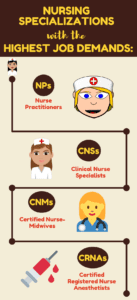
Nursing has a wide variety of sub-specializations, and this provides an opportunity to concentrate on specific types of nursing. As the need arises, there is a need to refine one’s practice and focus on a particular type of nursing or patient population. This is why nursing certification is also deemed vital since it enables you to show your knowledge and experience on a specific field. Nursing certification is recommended for registered nurses, advanced practice nurses and clinical nurse specialists.
A certified nurse in a certain area of nursing specialization needs to show to her employer that she is an expert in terms of that field. Nurses who are specialized in a specific field needs to become certified as they need to meet exam, experience and education requirements to attain this credential.
Nurses may specialize in various types of nursing as an RN in the absence of an advanced practice degree. Such kinds of certifications emphasize a nurse as being an expert in her respective field and may aid her in receiving promotion for the entire unit
Nursing Specializations for Registered Nurses (RNs)
Credentials can also be obtained from patient populations like cardiac patients, geriatric patients, and people with diabetes. A popular nursing specialty is a Critical Care Registered Nurse certification provided through the American Association of Critical-Care Nurses. This organization has several levels of certification all types of nurses in the critical care specialty.
Nursing Specializations for Advanced Practice Nurses (APNs)
There are four types of advanced practice nurses recognized based on the Advanced Practice Nurse Consensus Model, namely, certified registered nurse anesthetist, certified nurse-midwife, clinical nurse specialist, and certified nurse practitioners. Advanced practice nurses (APNs), specifically nurse practitioners, can specialize in a specific nursing type. They may specialize in mental health, gerontology, pediatrics, diabetes education, and school nursing. Compared to the RN certification, the clinical hours spent in school are counted towards the certification, so nurses are not required to collect more hours from attaining certification. APNs also have the right to select a specialization before deciding to commit to education and go for the required certification once the individual has completed school.
Nursing Specializations for Clinical Nurse Specialists (CNS)
Clinical nurse specialists are defined as a special form of the advanced practice nurse. Though they are not directly responsible for the assessment, diagnosis, and treatment of patients as that of nurse practitioners, they are vital to the functionality of the entire nursing unit. They deal with the learning of their subordinate nurses and may be involved in facilitating research work. A clinical nurse specialist may review data of patient outcomes and arrive at solutions on how to improve these situations. They specialize in gerontology, pediatrics, public health, and mental health.
Online vs. Brick and Mortar Nursing Degrees

BSN completion programs are considered one of the most accessible types of nursing courses or degrees online. RN to BSN programs, meanwhile, are most recommended with online learning, and this is considered an advantage since numerous organizations, like ANA to the AACN, encourage more nurses to complete their BSN.
One of the major decisions of nursing students deals with whether to earn a degree online or through a traditional school. There are young students through such as fresh graduates with an ADN who may prefer to go about the conventional way of learning since they want to enjoy the complete campus experience like student clubs and internships. Some nurses work with partner organizations or companies while attending classes on-campus for one or two days a week. There are even employers who are willing to pay for the expenses of students after completion of the program.
For most full-time working nurses though, online is regarded as the best option. Several accredited universities and colleges, both public and private, offer online coursework.
Online does not exactly equate to self-paced since there are synchronous and asynchronous online learning. Therefore, nurses may go online at specific times of the day for online activities and lessons. There are students though who may find self-pacing to be difficult, and some nursing students consider the traditional classroom as the most appropriate choice. Thus, they may look for a local program that offers nontraditional classes, such as an evening schedule or a twice-a-week schedule.
The online and traditional approach may be an either-or decision since some programs are hybrid. A large amount of the coursework can be completed online, yet the student still needs to go to the campus for occasional classes or practical learning. In the field of nursing, it is possible that there is a week-long clinical course that shall be conducted in a simulation laboratory.

Some programs are delivered online until the end as there are culminating projects which entail both travel and work service. For instance, the BSN completion students of Colorado Christian University go to Costa Rica for their healthcare expedition as a way of wrapping up their online education.
In checking the differences between traditional nursing education and an online approach, some factors need to be considered. The first one pertains to the core coursework of the nursing program, which involves the fundamental knowledge and theories of nursing. Such foundational courses may be completed both on-campus and online.
Location has been deemed as another factor to take into consideration. Students can study at the comfort of their own homes anywhere in the country through the online option while those who prefer the on-campus option of nursing education should apply to the campus itself.
Dynamic social interaction is best achieved personally with fellow students and your instructor or professor. Social interaction though is still possible online as students may access faculty members and fellow cohorts, yet not as instant as that of the brick-and-mortar approach.
Study habits are also a factor that needs to be considered when choosing between online and on-campus nursing education. A traditional nursing program is ideal for those who need to focus more on structure and accountability in the completion of tasks. Though the curriculum may be the same for both traditional and online nursing programs, the delivery of the content is entirely different. Thus, it is best to consider how the nursing student collects, gathers, and keeps information.
FAQ: Can I earn a Nursing degree through an online program?
In terms of 24/7 flexibility, online learning is regarded as more flexible compared to on-campus nursing education. Through the academic institution’s online learning platform, everything is very accessible in an instant.
Technological advancements have enabled people to integrate a broad range of multimedia content into the online curriculum, including 3D graphical presentations of the learning modules and simulated learning activities. The various student learning styles are met through the leveraging of versatility in terms of the online learning platforms of different academic institutions. In a classroom setting though, there are restrictions as to new learning styles.
Nursing Career Pathways, Information, and Outlook

The Bureau of Labor Statistics (BLS) has projected a 15% employment growth rate for registered nurses between 2016 to 2026. This is more rapid compared to the average in all occupations. Growth happens for several reasons, which include more focus on preventive care; increasing rates of chronic conditions like diabetes and obesity; along with a higher demand for healthcare services from the baby-boom population since they live longer and are more active. The median annual wage for registered nurses though was reported to be $70,000 in May 2017. On the other hand, the entry-level salary for RNs entering the nursing field with an associate degree is approximately $47,000.
The field of nursing has continuously experienced unexpected growth during recent years, and this may continue as well in the future. Numerous specialty areas suffer from debilitating nursing shortages, and this has arisen due to the rapidly growing American population, who need more healthcare services. Such demand for nurses has increased especially for some areas of specialization for nursing, and these are mainly listed below:
- Nurse Practitioners (NPs)– They responsible for conducting physical exams, diagnosis and treatment of common acute diseases and injuries; giving immunizations; management of high blood pressure, diabetes, and other chronic disorders; ordering and interpretation of X-rays and other laboratory tests; and counseling of patients on adopting healthy lifestyles and health care alternatives as part of their roles.
- Clinical Nurse Specialists (CNSs)– They are responsible in providing care in a wide range of specializations, like cardiac, oncology, neonatal, and obstetric/gynecological nursing, as well as pediatrics, neurological nursing, and psychiatric/mental health.
- Certified Nurse-Midwives (CNMs)– They give prenatal and gynecological care to healthy women. They also handle the safe delivery of babies in hospitals, private homes, and birthing centers; and proceed with follow-up postpartum care.
- Certified Registered Nurse Anesthetists (CRNAs)– They are responsible for administering more than 65% of anesthetics given to patients every year and are regarded as the only anesthesia providers in at least two-thirds of rural hospitals in the U.S.
Other in-demand nursing careers and their respective salaries include:
- Neonatal Nurse- $61,212
- Travel Nurse- $65,995
- Pediatric Nurse- $58,726
- Geriatric Nurse- $57,500
- Public Health Nurse- $57,167
- Nurse Educator- $73,710
- Nurse Advocate- $61,619
- Nurse Researcher- $81,500
- Pain Management Nurse- $61,619
- Psychiatric Nurse- $60,239
- Trauma Nurse- $61,860
- Informatics Nurse- $77,460
- Critical Care Nurse- $66,503
- Dialysis Nurse- $66,500
10 Common Nurse Occupations
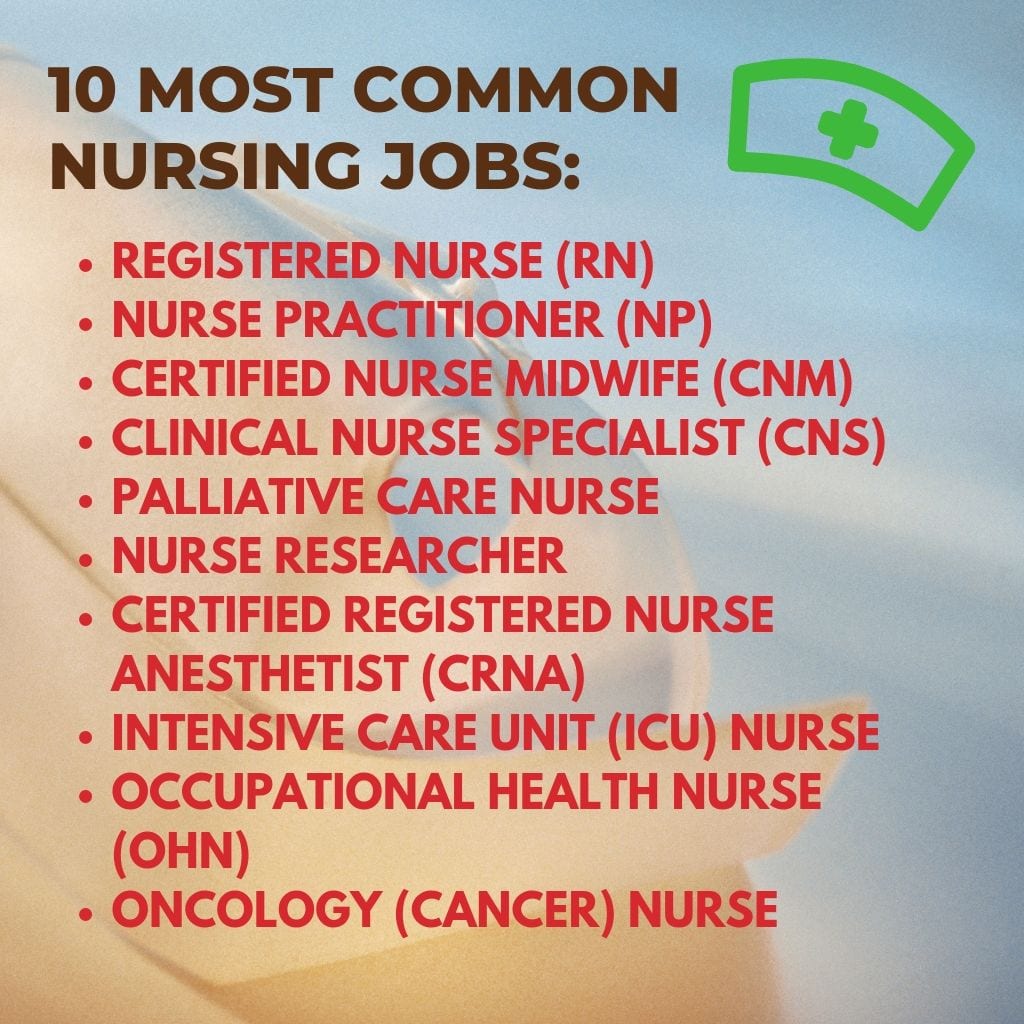
1. Registered Nurse (RN) primarily provides patient care and educate patients and the public about different health conditions that affect human health. Additionally, RNs support their patients and their families during the time of the medical procedure. Nurses are highly collaborative, often working in teams of physicians and fellow healthcare providers. Most registered nurses work in specialized areas, requiring additional education and training.
Be a Registered Nurse by earning a Bachelor of Science in Nursing (BSN), an Associate’s Degree in Nursing (ADN), or a diploma for completing an approved nursing program. As of May 2018, a licensed RN earns an average of $71,730 per year.
2. Nurse Practitioner (NP) offers advanced healthcare services to patients. These services pertain to comprehensive assessments of their overall health. They diagnose diseases, disorders, and other pertinent health conditions that affect their patient’s physical state. Most importantly, they take charge of administering initial treatment as well as healthcare management and therapeutic interventions.
Nurse Practitioners are required to have obtained at least a Master’sand a Doctorate in Nursing to practice. They are licensed to administer and prescribe medication to their patients. According to BLS, Nurse Practitioners receive a median pay of $113,930 annually.
3. Certified Nurse Midwife (CNM) is a licensed healthcare professional primarily focused on women’s reproductive health, especially in childbirth. They take the lead in delivering babies and manage emergencies before, during, and after the labor. Nurse Midwives also administer gynecological exams, prenatal care, as well as family planning services. Aside from a BSN degree, CNMs are required to secure a license. Those who want to specialize in the field should take a look at programs that are accredited by the Accreditation Commission of Midwifery Education (ACME). A Certified Nurse Midwife receives a similar annual salary of $113,930 as that of a Nurse Practitioner.
4. Clinical Nurse Specialist (CNS) is adistinguished Advanced Practice Registered Nurse (APRN). Clinical Nurse Specialists (CNS) design and develop standardized patient care. They work closely with hospital staff to ensure that the standards and guidelines are met. A CNS may choose to specialize in critical areas, such as in pediatrics, critical care, medical sub-specialty, pain, or stress management. To practice the profession, one must hold a Master’s or a Doctorate in one of the diverse areas of nursing practice. Clinical Nurse Specialists in the United States typically earn $111,662 a year.
Clinical Nurse Specialists’ responsibilities in the healthcare profession go beyond what is conventionally expected of a registered nurse. They diagnose, treat diseases and injuries, and administer patient care within their chosen field of expertise. Most importantly, they serve as consultants for nurses and other healthcare providers and continue to improve the overall healthcare sector.
5. Palliative Care Nurse plays a vital role in successful palliative care to the most vulnerable patients. They provide primary care and assistance to their patients, and their families during the final stages of the patient’s life. They ensure their patient’s comfort, maintain the quality of life, and manage their pain. Also, nurses who specialize in palliative care provide emotional support and advice to the families who are in grief. Due to the advanced training RNs receive from their bachelor’s degree, they serve as a liaison between the doctors, nurses, and the entire hospice staff. On average, a Palliative Care Nurse earns $96,044 a year as of April 2020.
6. Nurse Researcher takes on complex research in various areas in the medical field. They take the lead in scientific studies sponsored by academia or organizations focused on research, development, and innovation. Nurse Researchers implement scientific studies that will improve the entire healthcare system, and how health care is delivered. In addition to the complex nature of their work, these typeS of scientists identify research questions, conduct studies, gather and analyze data, and draw conclusions. A bachelor’s degree is required for an RN to be employed as a Nurse Researcher and earn an average of $95,000 per year. To obtain advanced education and focus on research, which involves funding, you may need to complete a master’s degree in a specialized field in nursing.
7. Certified Registered Nurse Anesthetist (CRNA) or Nurse Anesthetist administers anesthesia in medical procedures. They also monitor the patient’s status while under anesthesia by continually checking their vital signs. CRNA oversee the patient’s recovery process and the possible adverse effects of anesthesia after the procedure. Post-Operation recovery is as remarkable as that of the operation itself. Nurse Anesthetists are RNs who have completed their BSN and have acquired specialized graduate education. On average, a Certified Registered Nurse Anesthetist receives $110,520 as an annual salary.
8. Intensive Care Unit (ICU) Nurse provides hands-on health care to patients who require highly specialized and trained nurses. The Intensive Care Unit (ICU) is the critical care unit in the hospital, especially for the seriously ill or critically injured patients. ICU Nurses in the unit are focused and have the stamina for caring for patients with life-threatening medical conditions. RNs who want to specialize in the area can take one of two certifications to qualify as an ICU Nurse. RNs can either take Certified Critical-Care Registered Nurse (CCRN) certification given by the American Association of Critical-Care Nurses. Or the Certified Neuroscience Registered Nurse (CNRN) certification. An ICU Nurse makes an average of $73,457 annually.
9. Occupational Health Nurse is a specialty practice centered on delivering high-quality health care that meets industry standards. Occupational Health Nurses are expected to help run health and safety programs to employees and association groups. Sometimes referred to as Occupational And Environmental Health Nurses (OHNs), they utilize their medical knowledge and training to pick new hires. They promote and reestablish the importance of health care within the workplace by emphasizing pre-placement medical. OHNs have acquired specialized knowledge in both health and business to ensure the safety and health of employees.
To become an Occupational Health Nurse and get an average of $85,424 per year, you must be a Registered Nurse. A certification from the American Board for Occupation Health Nurses, Inc. is a requirement before practicing as an OHN. Also, you must meet the required hours of training and work experience to be certified.
10. Oncology (Cancer) Nurse offers medical services to cancer patients of all ages. It is a physically and emotionally taxing specialized practice for RNs who are also tasked to provide support to the patient’s families and caregivers. Oncology Nurses are capable of administering medications and provide stress management sessions to those who assist in caring for the cancer patient. An Oncology Nurse is required to have a BSN degree and be a licensed RN. The most recent data reveal that oncology nurses in the US earn as much as $93,928 a year.
OTHER NURSE OCCUPATIONAL TITLES
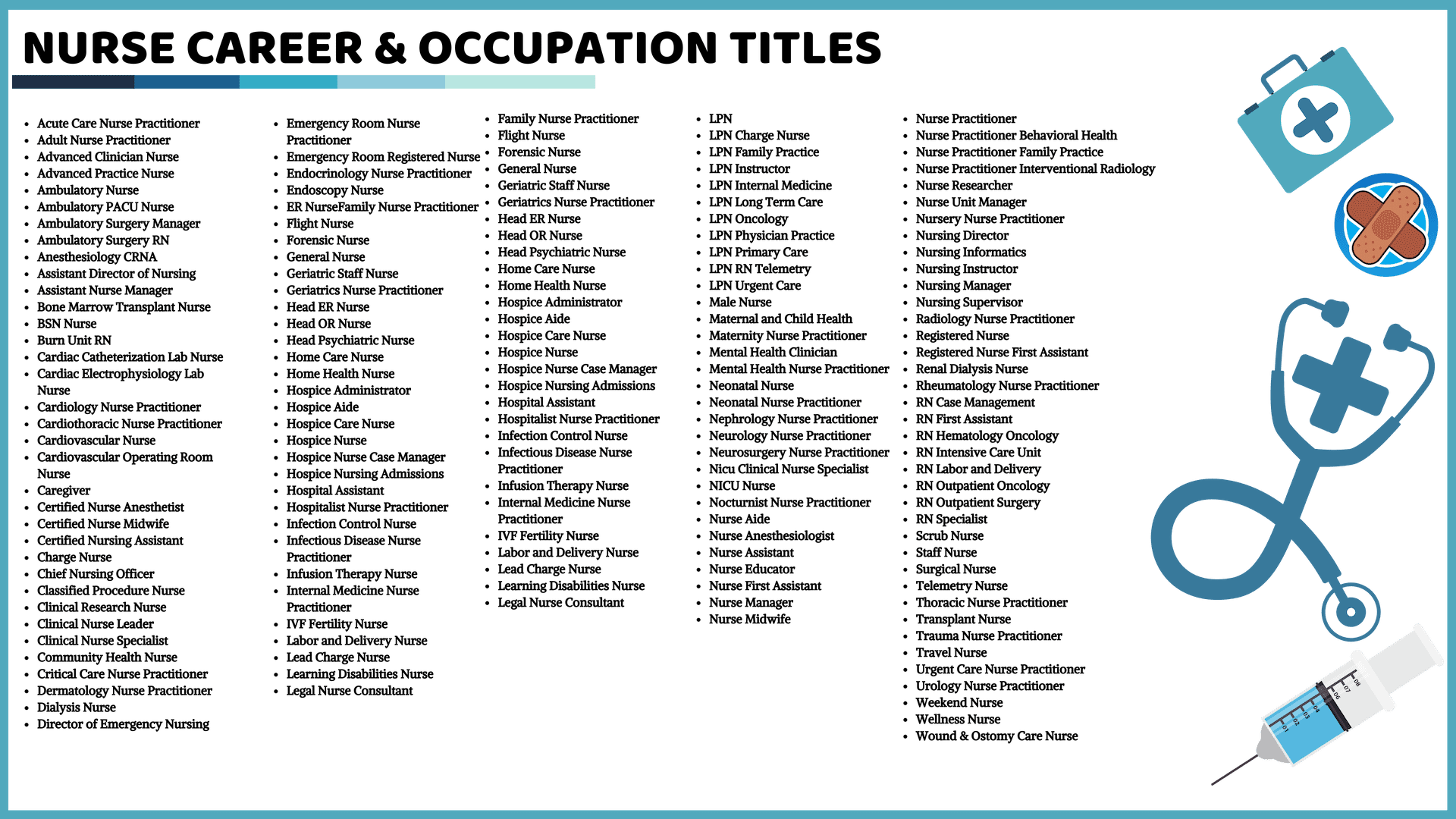
30 HIGHEST PAYING NURSING CAREERS

Gerontological Nurse Practitioner
Elderly patients require specialized care, and Gerontological Nurse Practitioner is trained registered nurses who care for the elderly. They work closely with geriatric patients in monitoring their overall health and administering pain management techniques and medication. GNPs focus on overcoming health issues (i.e., memory loss, weakened motor response, and loss of appetite) among ailing patients. The aging population is more prone to debilitating illnesses, and GNPs ensure that they receive the right medical care and support. These nursing professionals aid their patients into overcoming and coping with the numerous health issues that they may acquire. A registered nurse who wishes to practice the specialization must become Certified Gerontological Nurse Practitioners.
Gerontological Nurse Practitioner annual salary: $173,133


Certified Registered Nurse Anesthetist (CRNA)
Certified Registered Nurse Anesthetist (CRNA) or Nurse Anesthetist remains to be one of the highest paying nursing profession. CRNAs are registered nurses who are highly skilled and trained in preparing and administering anesthesia. They work closely with surgeons, anesthesiologist, podiatrists, dentists, and other healthcare professionals. Before registered nurses can practice as Nurse Anesthetist, they must obtain a passing rate in the National Certification Examination. According to DataUSA, in 2017, the total CRNA workforce in the United States consists of 31,012, and is seen to decline by -4.5% per year. What makes Certified Registered Nurse Anesthetist so valuable is their proficiency in providing the same level of care as an anesthesiologist. Most medical facilities hire CRNAs because they bring their superior skills to the healthcare industry while still being cost-efficient.
Certified Registered Nurse Anesthetist annual salary: $153,891

Chief Nursing Officer

Chief Nursing Officer (CNO) provides overall administrative oversight in a healthcare organization. The CNO is mandated by the hospital to maintain legal and statutory mandates in the clinical and patient-care standards. The chief nursing officer ensures that patients under their supervision receive the best health care. They work closely with the hospital executives and other stakeholders in making sure that the right infrastructure and resources are available to deliver medical services. Chief Nursing Officers provide invaluable managerial insight in improving the quality of healthcare offered in the facility. Lastly, they are responsible for designing, planning, and implementing new strategies, the medical and health services industry. To get the position, applicants must possess a bachelor’s degree in nursing, and preferably, a graduate degree.
Chief Nursing Officers annual salary: $136,350

Nurse Practitioner
As Advanced Practice Registered Nurses or APRNs, Nurse Practitioners (NP) have acquired licensing and certification, and are referred to as “full practice authority.” In some states in the country, NPs can work independently without the supervision of a doctor. To a certain degree, NPs and physicians share similar functions. They can prescribe medication, diagnose illnesses, examine patients, and provide medical care. A Master of Science in Nursing (MSN) degree is the minimum academic requirement to practice as an NP. Most importantly, you must earn a Nurse Practitioner licensure examination required by the state.
Nurse Practitioner annual salary: $113,930

Nursing Home Administrator
Nursing Home Administration is a highly specialized area in health services management. It requires proficiency in two areas – business and healthcare. A registered nurse who ventures out in a career as a Nursing Home Administrator takes leadership responsibilities, supervising nursing home staff. Administrators of nursing homes also coordinate with various departments in the facility (i.e., food, logistics, financial, social services, and public relations). Also, the Nursing Home Administrator must keep abreast of the new laws and regulations about the healthcare and nursing home care facilities. Part of the administrative function is ensuring that new hires undergo the necessary training to complement the needs of the nursing home facility.
Nursing Home Administrator annual salary: $107,987

Pain Management Nurse Practitioner
Pain Management Nurses are RNs who specialize in administering pain management techniques and medication to post operations patients or those with chronic pain issues. They assess patients to determine the source of pain and identify the most viable course of treatment. Pain Management Nurses educate patients under their care, ensuring that they understand the possible effects of the different medication to avoid addiction and dependence. Their specialized education allows these nurses to effectively address pain identification, as well as the physiological and psychological effects of pharmaceutical intervention. With sufficient experience as a Registered Nurse can specialize as a Pain Management Nurse. They must have an unrestricted active nursing license, with Nurse Practitioner certification.
Pain Management Nurse Practitioner annual salary: $104,000

Neonatal Intensive Care Unit Nurse

Neonatal Intensive Care Unit (NICU) Nurses have dedicated nursing professionals who care for the most vulnerable patients – premature newborns and those with a severe health condition. They provide frontline care necessary to secure newborn babies. Neonatal nurses work round the clock, ensuring that proper medical care and medication are provided to babies under their care. NICU Nurses are advanced practice registered nurses who are highly skilled in monitoring babies until they are developed enough to be discharged. In the United States, nearly half a million babies are born preterm, consequently having low birth weights. These babies require specialized care, from NICU nurses who are trained for the critical job. Aside from caring for the newborns, they also give emotional support, as well as education to parents during their stay in the NICU.
Neonatal Intensive Care Unit Nurse annual salary: $102,357

Certified Nurse Midwife
One of the most lucrative nursing profession, Certified Nurse Midwives are RNs who provide professional care for patients who require obstetric and gynecological needs. Nurse Midwives assist patients during labor and delivery. Also, they also offer postpartum care, ensuring that new mothers are equipped to care for an infant. They primarily focus on the safety of both the mother and the newborn while identifying the additional care necessary for their quick recovery. Certified Nurse Midwives work under the direct supervision of an OB-GYN. RNs who venture into specializing as a CNW need to secure a certification through the American Midwifery Certification Board. Most importantly, they need to earn the Certified Nurse-Midwife and Certified Midwife designations.
Certified Nurse Midwife annual salary: $102,340

Mental Health Nurse Practitioner
Mental Health Nurse Practitioners are skilled and trained registered nurses who are vital in addressing issues in the mental health care industry. They provide primary mental health care in various medical facilities. Considered APRNs, mental health nurse practitioners guide their patients towards achieving mental wellness. Mental Health Nurse Practitioner provides primary mental health intervention in high-risk situations. They collaborate with therapists, and psychiatrists are aiding mental health issues patients are experiencing. Given the necessary certification, Mental Health Nurse Practitioners can recommend therapeutic interventions and treatment plans specifically designed to patient’s need. You must be a Registered Nurse to pursue the specialty, as well as a master’s degree in the area.
Mental Health Nurse Practitioner annual salary: $101,969

Psychiatric Mental Health Nurse Practitioner
Psychiatric Mental Health Nurse Practitioner are specialized nursing professionals who provide support to patients with psychiatric and mental health illness. Psychiatric care is crucial in every healthcare facility, and PHNPs provide holistic care to psychiatric patients and those with behavioral problems. In addition to medical treatment, they provide counseling, emotional, and physiological care to their patients. They aid people with mental health problems to regain their confidence by effecting life-changing care and provide a positive impact on their lives. Registered Nurses may specialize in Psychiatric care by obtaining a master’s or a doctorate in the field. Also, they must be board certified through the American Nurses Credentialing Center (ANCC).
Psychiatric Mental Health Nurse Practitioner annual salary: $101,930


Psychiatric Nurse Practitioner
Psychiatric Nurse Practitioners (PNP) are specially trained nurses who play a vital role in strengthening mental health care services in any medical facility. They are Advanced Practice Psychiatric Nurses who guide their patients towards achieving mental wellness. PNPs interview patients regarding their symptoms and complaints to assess their condition. Most importantly, Psychiatric Nurse Practitioners determine what causes the disease and the course of medical action necessary to address the situation. Also, they screen patients for other physical illness which could determine the underlying cause of the psychiatric disorder. A critical function that these nursing professionals perform is the assessment of risk factors in evaluating psychological issues. RNs need to earn a master’s degree in psychiatric-mental health to become PNPs.
Psychiatric Nurse Practitioners annual salary: $101,930

Informatics Nurse
Nursing Informatics (NI) is a nursing specialty which integrates nursing science with the analytical aspect of information management. Nurses who specialize in the field are tasked to identify, define, manage, and communicate complex medical data in the nursing practice. Informatics Nurse provides support to nurses, physicians, other healthcare professionals, and stakeholders in their decision-making process. The American Medical Informatics Association recognizes the importance of information management and interpretation in the healthcare industry. Nursing Informatics promotes a holistic approach in public health, paving the way towards an integrated health care industry. Undoubtedly, it is a more technical nursing career, but it stresses the importance of enhancing patient care. Securing a Bachelor of Science in Nursing degree is the ideal entry in the industry, as well as nursing licensure. A master’s degree with specialized coursework is required to become a Nursing Informatics.
Informatics Nurse annual salary: $101,014

Orthopedic Nurse
Orthopedic nursing is one of the top nursing specialty in the United States. It is a career path that allows registered nurses to work closely with patients during the stages of recovery. They assist doctors in assessing and diagnosing patients, as well as in prepping them for orthopedic surgery. Orthopedic Nurses mainly help patients recover from musculoskeletal diseases and disorders. Musculoskeletal conditions may include arthritis, fractured and broken bones, joint injuries and replacements, malformations, and osteoporosis. Sports medicine is a typical field of practice for Orthopedic Nurses. However, going into the field requires a unique set of skills and academic knowledge.
The first step towards becoming an Orthopedic Nurse is earning a BSN degree and passing the nursing licensure exam. After securing your license as an RN, you must finish a certification course which will make you eligible to take the Orthopedic Nurses Certification Board exam.
Orthopedic Nurse annual salary: $100,035

Emergency Room Nurse Practitioner
Emergency Room Nurse Practitioner is the first responders, nurses who treat patients who come in the emergency room. They ensure that proper medical care is administered to patients who require emergency care. ER nurse practitioners work in collaboration with physicians to assess the degree of medical care a patient needs. Typically, Emergency Room Nurse Practitioners prescribe and administer the necessary medication to manage injury or illness. To become an ER Nurse Practitioner, you must have a Certified Registered Nurse Practitioner (CRNP) certification in the specialty area.
Emergency Room Nurse Practitioner annual salary: $93,890


Advanced Practice Registered Nurse
Advanced Practice Registered Nurse or APRN is the umbrella term for Nurse Practitioners, Clinical Nurse Specialists, Nurse Anesthetists, and Nurse Midwives. These registered nurses play a vital role in each of their chosen area, and the future of nursing health care services. APRNs have advanced medical and clinical knowledge, which allows them to execute the demands of their work effectively. They are often assigned in the frontline, providing preventive care services to every patient that seeks medical care. As Advanced Practice Registered Nurses, they are authorized to diagnose and assess patients, as well as prescribe proper medication or treatment plan. They remain committed to the nursing profession, so they engage in continuous education and innovation. This is a necessary step to keep abreast of technological and methodological advancements in the medical field. Registered Nurses must hold at least a master’s degree in a chosen specialization, and additional licensing as required by the state.
Advanced Practice Registered Nurse annual salary: $93,388

Family Nurse Practitioner
Family Nurse Practitioners (FNPs) are registered nurses who have acquired specialized graduate education in primary health care. FNPs provide health care to people of all ages, similar to that of a primary health care physician. They perform physical examinations, consult with their patients, diagnose illnesses, assess, and prescribe medication. Family Nurse Practitioners recognize the need to educate their patients to develop healthy lifestyles, especially within the family. They promote health-conscious choices to prevent common diseases that affect all age groups.
Most importantly, FNPs fill a crucial role in the delivery of healthcare services, especially the underserved sector of society. This makes the specialization a rewarding field in the nursing profession. You must secure a Family Nurse Practitioner-Board Certified (FNP-BC) designation, and a master’s degree before you can practice. Family Nurse Practitioners build long-term relationships with their patients, which enables them to monitor their health and progress.
Family Nurse Practitioners annual salary: $92,056

Medical Surgical Nurse Managers
Medical Surgical Nurse Managers provide direction and administrative structure to the entire medical-surgical care staff. Working with surgeons, physician, anesthesiologists, they ensure that patients who have undergone the surgical procedure have a seamless recovery. As nurse managers, they are primarily responsible for providing accountability, planning, directing, evaluating, and leading the nursing care department dedicated to post-operation patients. Most importantly, they oversee the selection and training of new surgical nursing staff. Also, they respond to the various changes, often unprecedented, in patient volume. Medical-Surgical Nurse Managers ensure that the team will provide medical care to all post-op patients based on hospital policies and procedures.
Medical Surgical Nurse Managers annual salary: $92,014


Critical Care Nurse
Critical care nursing requires skilled and experienced nurses to work long hours and care for critical patients regularly. Often working in the Intensive Care Unit (ICU), Critical Care Nurses or ICU Nurses cater to high-risk patients or those with life-threatening health problems. They assess the patient’s condition and plan out the patient care plan to be implemented. Due to their advanced medical training, they provide advanced life support, assisting physicians in performing various medical procedures. They respond to life-saving situations and administer nursing standards and protocol necessary to stabilize their patient. ICU Nurses are patient-oriented, providing round the clock monitoring. They also monitor ventilators and other medical equipment from malfunctioning. To become a Critical Care Nurse, be a Certified Critical Care Nurses (CCRN) through the American Association of Critical-Care Nurses (AACN).
Critical Care Nurse annual salary: $91,670

Oncology Nurse
Oncology Nurses are hands-on in caring for cancer patients who are facing the realities of their illness and weaknesses. They primarily tend to people of all ages who are diagnosed with cancer, or terminal diseases. It is a challenging specialty, both physically and emotionally. Oncology nurses guide their patients, and their families cope with anxiety and uncertainties of the disease. These are registered nurses who chose to specialize in providing care and treatment to cancer patients. They administer medication and are hands-on in ensuring that their patients commit to the treatment plan. Nurses in the oncology department work with oncologists and physicians formulate goal-oriented care plan specifically designed to cater patient’s need. An Oncology Nurse needs to be prepared in providing long-term support throughout their patient’s treatment.
Oncology Nurse annual salary: $91,209

Clinical Nurse Specialist (CNS)
A Clinical Nurse Specialist (CNS) is a registered nurse who has acquired graduate-level education and is certified in their chosen specialty. This demonstrates an advanced academic knowledge in the medical field as well as an advanced clinical background. CNs are Advanced Practice Registered Nurses (APRNs) who are have secured a certification which enables them to prescribe medication. Since CNS are both clinically and academically trained, they usually focus on working in the academe, research, even set up their consultancy practice. Clinical Nurse Specialists are deemed leaders in the nursing profession. They are considered mentors, educator, and effective advocates in the field. With their proficiency to effect leadership, while maintaining a keen clinical eye, they are capable of promoting change within the healthcare industry.
Clinical Nurse Specialist annual salary: $87,469

Charge Nurse
A Charge Nurse oversees the entire nursing care services offered in a medical hospital or facility. Registered Nurses who assume the lead role takes on the responsibility that comes with the title. This responsibility includes planning, coordination, and evaluation of the entire nursing unit and all its activities. They are highly clinically skilled and knowledgeable in management and operation. Charge Nurses have decision-making, organizational, and interpersonal skills that allow them to facilitate effective healthcare services. The Charge Nurse of a medical facility coordinates with the Director of Nursing and Department Managers in ensuring that goals are met. Most importantly, they take charge of complying with the Department of Health and Federal Health Care Administrations regulations.
Charge Nurse annual salary: $85,939


Nursing Administrator
Nurse Administrators or Nurse Managers are RNs who have an advanced academic degree with primary function in the office setting. They are part of the managerial staff, overseeing and managing the entire healthcare facility, a department, or clinic. Nurse administrators may be employed by a hospital, a physician, or multiple physicians to take charge of scheduling, annual performance reviews, hiring and selection, and training new staff. Most importantly, they attend meetings and seminars to design sound policies for the entire facility. They ensure that every aspect of the medical service is in line with healthcare laws and regulations such as HIPAA. Nurse Administrators serve as a liaison among various departments to ensure seamless delivery of health care services.
Nurse Administrator annual salary: $85,582

Infection Control Nurse
Infection Control Nurses are vital in ensuring that the hospital or medical healthcare facility are free of infectious viruses and bacteria. Infection control is a crucial component of healthcare services. Registered nurses who specialize in infection control find practical and effective ways to isolate the disease outbreak in the hospital. Most importantly, they found strategical means of minimizing the spread of infection. Infection Control Nurses implement proper infection control protocols, according to the standards set by various authoritative organizations in the medical field.
Infection Control Nurse annual salary: $82,979

Nurse Researcher
Nurse Researchers are registered nurses who devote their professional lives in the pursuit of science and innovation. They typically work in universities, medical laboratories, research facilities, and healthcare facilities. Career opportunities for nurse researchers are endless, especially in today’s fact-based analysis. They can find employment in pharmaceutical companies, allowing them to grow professionally. As researchers, they are excellent communicators, both oral and written. Nurse researchers focus on conducting and writing research and publishing their work on credible medical journals. A master’s degree or a doctoral degree is essential in establishing yourself as a Nurse Researcher.
Nurse Researcher annual salary: $81,500

Pediatric Nurse
Pediatric Nurses are registered nurses who give primary healthcare to children of all ages. Pediatric care is an excellent choice to specialize in. Nurses in the field provide care to children from infancy through childhood, and even during their adolescent development. Various health issues affect children, specifically, so pediatric nurses focus on making sure that propped medical attention is given to all their patients. Specialized knowledge is required to provide quality health care to children. Since the age group is highly sensitive and often poses some limitations, there is a need for pediatric nurses to be overly cautious. And excellent communication skills can go a long way. Registered Nurses who wish to become a Pediatric Nurse must comply with the Certified Pediatric Nursing (CPN) licensure. After gaining work experience, you can begin a fulfilling career as a Pediatric Nurse.
Pediatric Nurse annual salary: $79,500

Certified Dialysis Nurse (CDN)

Certified Dialysis Nurse (CDN) provides direct and individualized medical care to patients who have severe problems with their kidneys. It is currently among the growing specialties in the nursing field. A dialysis nurse is a registered nurse who has acquired a specialization in nephrology. They are certified to administer hemodialysis or peritoneal dialysis to patients with acute and chronic renal failure. CDNs also assist their patients during the procedure, ensuring that they understand the risks and possible reaction to the treatment. RNs who choose to specialize as a Dialysis Nurse need to complete the required number of hours of experience in caring for dialysis patients. This can be achieved in two years. Additionally, they must meet the requirements for applying for the Certified Dialysis Nurse certification and pass the exam.
Certified Dialysis Nurse (CDN) annual salary: $78,000

Legal Nurse Consultant
Legal Nurse Consultants (LNC) provide invaluable knowledge, expertise, and insights into the legal team of the healthcare facility. LNC has a strong background in clinical nursing practice, which puts them in an indispensable position in the medical field. They apply the technical nursing process in evaluating complex medical information in legal cases involving the nursing practice. You should not confuse Legal Nurse Consultant to lawyers or paralegals as they do not possess the requirements in the legal profession. More importantly, legal nurse consultants fill the unique gap between the legal processes involved in the healthcare industry and the science behind the healthcare service delivery. To start a career in legal nurse consulting, you need a bachelor’s degree in nursing or a master’s degree in a specified area. Legal Nurse Consultants can work independently, along with various types of people and across many industries.
Legal Nurse Consultant annual salary: $75,328

Nurse Educator
Registered Nurses who have obtained advance nursing degrees have the necessary credential to become Nurse Educators. As professors, they teach the nursing curriculum in various colleges and universities that offer Bachelor of Science degree programs, or its equivalent. Nurse Educators educate the next generation of nurses to excel in the profession. Nurse Educators exude leadership qualities, excellent communication skills, and a strong background of the subject matter. They are a part of the group of experts who designs, evaluates, updates, and implements the changes in the nursing curriculum. Educational professionals who devote their expertise into teaching nursing are vital in ensuring the quality of nursing care in the country.
Nurse Educators annual salary: $73,812

Health Policy Nurse
Nurses in the health policy sector play an integral role in developing and implementing health care policies. Health Policy Nurses are passionate about ensuring that health and public policy align with the goals of the World Health Organization (WHO) and the Department of Health. Registered nurses who devote their profession in developing health and public policy are the visionaries of the health care industry. They define the future of healthcare service delivery, outlining priorities to set the legislative process of health policy organizations. Nurses bring in a practical perspective in the decision-making process of various organizations and lawmakers in implementing healthcare policies that benefit the public. Health policy nurses analyze and evaluate healthcare policies, law, and regulations, as well as advising policymakers in the medical industry.
Health Policy Nurse annual salary: $72,830

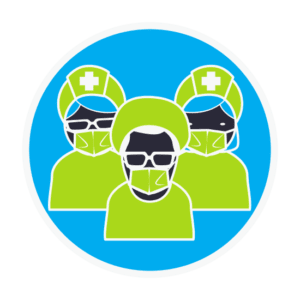
Medical-Surgical Nurse
In the United States, Medical-Surgical Nursing is among the largest nursing specialty. RNs who specialize as a Medical-Surgical Nurse is a specialized area in nursing that primarily caters to adult patients who are recovering from surgery. As the primary healthcare providers for post-operation patients, medical-surgeon nurses assess patients and coordinate their care with the rest of healthcare staff. Due to the high-risk patients in the medical-surgical unit or surgical ward, Medical- Surgical Nurses undergo a lot of clinical training and experience. Nurses who wish to specialize in the medical-surgical area need to take the Certified Medical-Surgical Registered Nurse (CMSRN®) exam through the Academy of Medical-Surgical Nurses’ (AMSN) Medical-Surgical Nursing Certification Board (MSNCB).
Medical-Surgical Nurse annual pay: $65,739
10 UNIQUE NURSING CAREERS
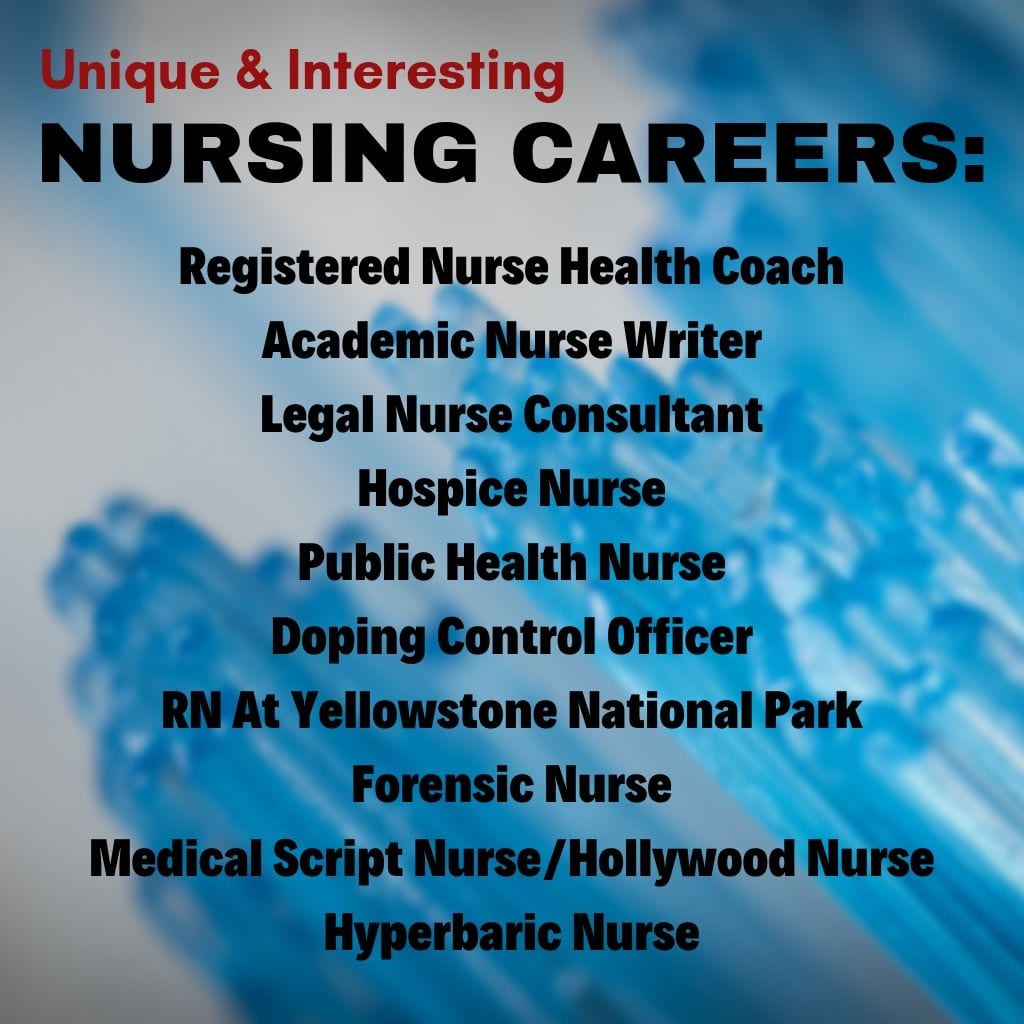
Registered Nurse Health Coach
Patients who have experienced critical medical situations often require the services of a Registered Nurse Health Coach. As a nursing specialty, they provide training chronically ill patients on how to care for themselves. RN Health Coaches introduce a healthy lifestyle to their patients and adopt these changes into their daily routine. It is essential that they secure their patient’s health as a top priority. Coaches may specialize in any illness or specific group as they aid their patients towards recovery. Typically employed by insurance companies, RN Health Coach may earn an average of $69,270 annually based on the National average.
Academic Nurse Writer
Become a vital part of educating future nurses as they ply towards a rewarding career in the healthcare industry. Academic Nurse Writers dedicate their professional life into writing and publishing nursing-related materials, like textbooks, manual, and patient care handbooks. They also write for medical-related websites, provide services to insurance companies, and regulatory bodies that dictate the health care service delivery. What sets Academic Nurse Writers apart from other authors is their technical expertise in nursing practice and a solid grasp of grammar. They can either work as a full-time writer, freelancer or with a staff of other writers earning at least $70,873 a year.
Legal Nurse Consultant
Legal Nurse Consultants are among the highest paid nonclinical careers in the nursing profession, with an average yearly income ranging from $59,045 to $204,015. They possess highly technical skills in both the medical and legal field, making them a valuable part of the healthcare industry. As consultants, they assist lawyers, and other legal professionals navigate the complexities of medicine, medical procedure, and medical practice. Insurance companies hire Legal Nurse Consultants to ensure compliance with medical standards and legal mandates.
Hospice Nurse
Terminally ill patients require 24/7 attention and medical assistance as they go through the most challenging time of their life. Hospice Nurses make sure that these patients receive the utmost care and support as they face their demise. They provide psychological and emotional support to their families, especially in the time of grief. As registered nurses, they administer medicine, conduct tests, and monitor their patient’s vital signs. Most importantly, they aid them in managing pain and the inevitability of death. Hospice Nurses in the United States receive a median annual salary of $81,187 per year.
Public Health Nurse
Public Health Nurses are key actors who ensure that community health programs are properly implemented. They promote wellness and advocate for a health consciousness among the communities they work with. To educate vulnerable age groups, they conduct seminars and public awareness programs regarding the different medical conditions and existing treatments. Public Health Nurses highlight transmissible diseases that affect both children and adults of all ages. Prioritizing their advocacy in maintaining health and wellness, they find employment in schools, government agencies, non-profit organizations, and medical facilities. The average national salary for public health nurses is reported to be $57,227 annually.
Doping Control Officer
Athletes who compete in international sporting events are required to go through a thorough testing process. Testing on these athletes is done by the World Anti-Doping Code and the International Standard for Testing (ISTI). Registered Nurses who carry out the tests are called the Doping Control Officer (DCO). They work with different athletes, in various athletic meets, as well as concerned agencies, commissions, and organizations to minimize irregularities. Illegal performance-enhancing techniques are highly controversial and contested the issue in sports. A DCO takes charge in evaluating, monitoring, and performing tests on professional athletes before the competition. In the United States, DCO’s can find employment in the World Anti-Doping Agency (WADA), the National Anti-Doping Organization (NADO), or the Regional Anti-Doping Organization (RADO). A leading anti-doping agency in the country pays an average of $110,238 per year.
RN At Yellowstone National Park
The Yellowstone National Park is a treasure that the government has sworn to preserve. There is a medical team on standby called the Medcor Onsite Health Clinic at Yellowstone, which is open year-round. As a Registered Nurse at Yellowstone, you will have a unique opportunity to provide emergency medical services to the sick and injured. Medcor employs experienced physicians, nurse practitioners, and RNs. The entire medical staff is exposed to an exciting and rewarding professional life at the park. On average, an RN at Yellowstone National Park earns $67,142.
Forensic Nurse
Forensic Nurses are RNs who devote their professional career in helping victims of violence, abuse, or neglect. They gather evidence to support the case against the accused and assist law enforcement officers in expediting the investigation. Forensic nurses are crucial to maintaining sound healthcare and the criminal justice system. They help communities by training pathologists and coroners to accurately examine the victim’s body. Based on the research conducted by the International Association of Forensic Nurses (IAFN), forensic nurses provide services beyond physical examination, including emotional support. A Forensic Nurse in the US earns $66,000 per month.
Medical Script Nurse/Hollywood Nurse
If you enjoy watching medical-related movies or TV shows and is a Registered Nurse, consider a career as a Medical Script Nurse. This nursing occupation welcomes creativity and three-dimensional perspective in both the medical and entertainment world. Medical Script Nurse is an essential role on set. They ensure that the medical procedure, technique, medical equipment, and the terminologies are accurately portrayed on-screen. This is one of the few nursing occupations that offer a great prospect as a part-time job. Medical Script Nurse can earn up to $81,904 while working side by side with a creative and enthusiastic team.
Hyperbaric Nurse
Hyperbaric chambers are products of smart and highly-perceptive innovation. These chambers are used to treat divers, astronauts, or others who have experienced the same thing. Hyperbaric nurses are registered nurses who have fully complied with standard operations. To become a Hyperbaric Nurse, you must be an RN and has fully satisfied the requirement set by the Baromedical Nurses Association. The hyperbaric chambers are not a new technology, and having medical stuff while you recover is a reassuring feeling. Specialize as a Hyperbaric Nurse and earn at least $39,000 a year.
Top Travel Nurse Careers
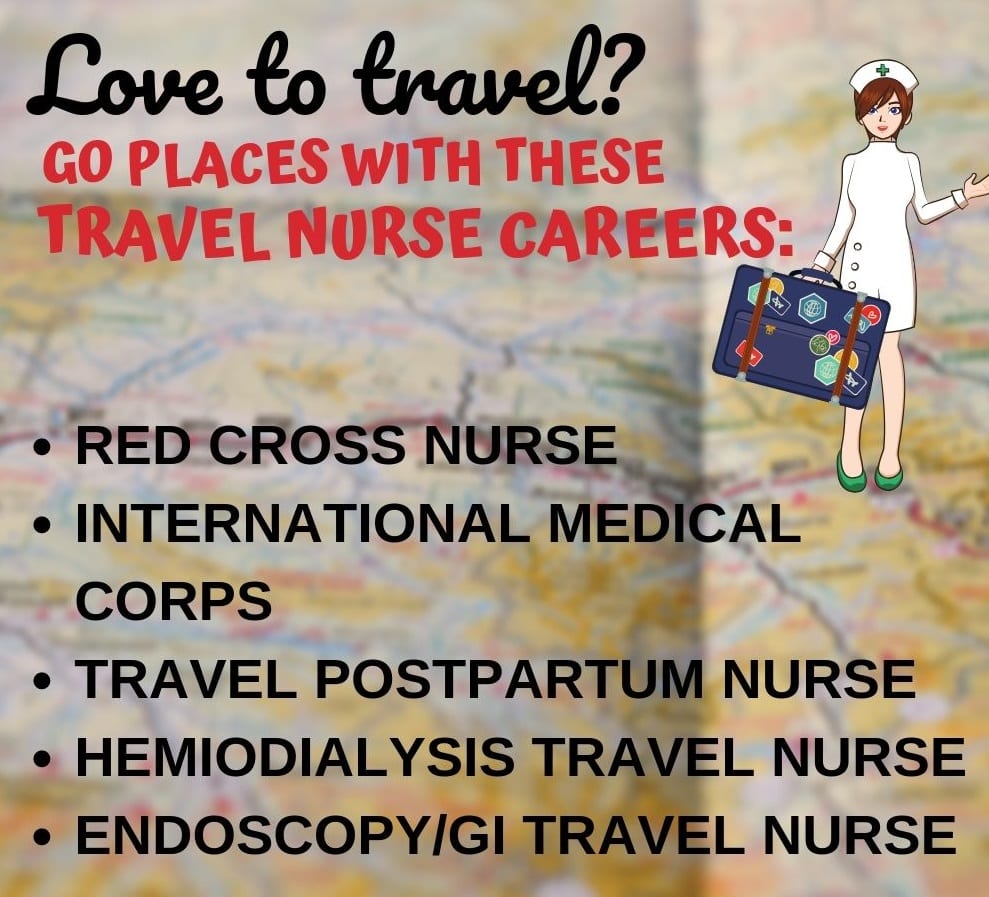
Travel Nurses work with various agencies that require their medical services, often short-term, giving Registered Nurses a flexible career path. It is a job that would require you to showcase your clinical skills while allowing you to travel. Most travel nurses fill in for their colleagues in the profession. They take over the job of nurses who are on maternity leave, who are sick or are absent for similar reasons. Assignments may vary in length. Typically, contracts last in increments of 13 to 40-hour work weeks.
An essential requirement for travel nurses is a degree in Nursing, at least an Associate of Science in Nursing (ASN), and passing the Accreditation Commission of Midwifery Education (ACME).. Of course, having a strong background and experience in the clinical field will set you aside from your competitors. At least a year of experience in a hospital setting is a great way to establish yourself as an expert in the discipline. Additional certification may be required by some medical facilities, especially in other states. Due to the shortage of competent nurses, being a travel nurse is a viable career track, for both full- and part-time nurses. Upon being hired, agencies will hold an orientation period that could last for several days. After which, you will be deployed to your assignment, and your schedule will be provided.
The job requires traveling, and risk is highly likely to happen. So the salary for the position is significantly higher and would include housing, travel insurance, health benefits, and a stipend. Holding a Master’s of Science in Nursing (MSN) will be beneficial to you when it comes to paying, and area assignments. However, an MSN degree is not an absolute requirement.

Red Cross Nurse
Red Cross Nursing is committed to strengthening community resiliency by providing emergency medical response whenever a disaster strikes. It is a proud tradition based on selfless service and ensuring that every person is aided to safety. The International Red Cross Movement puts nursing at the core of its mission. Red Cross Nursing owes its legacy to Clara Barton, an amateur nurse, and the founder of the American Red Cross. She provided emergency medical care to the soldiers who served during the Civil War.
Red Cross Nurses respond during natural disasters, such as earthquakes, hurricanes, storm, tornados, tsunami, fire, and flood. This is an avenue for nurses, mostly travel nurses, to contribute to the communities affected by the calamity. Nurses under the Red Cross wear a uniform – a vest and a pin – allowing them to administer medical and clinical procedure to disaster-ridden people. Today, more than 20,000 nurses serve as Red Cross Nurses in both volunteers and paid capacity. Either way, they are always ready to respond and provide disaster services.
International Medical Corps. Nurse
With a noble cause, the International Medical Corps. is dedicated to providing lifesaving healthcare and medical supplies to vulnerable communities all over the world. They focus on making sure that children, families, women, and victims of war and conflict are given enough and proper medical care. The organization provides disaster nursing wherever it is needed. Nurses respond to some of the most extreme conditions that affect a significant number of people. International Medical Corps works towards relieving the suffering of those who have seen the worst in the world.
Travel Nurse Postpartum
Postpartum nurses assist new mothers during their physical and emotional needs after delivery. You are expected to manage the care of both the mothers and their infants. The job will require applying the sophisticated assessment methodologies and intervention in ensuring the health and safety of the mother and the baby. Travel Nurse Postpartum monitor the patients and assess potential high-risk problems that could compromise their health. Additionally, postpartum nurses educate and support new mothers and their families on how to care for the infant. You need to know precisely the appropriate emergency treatment protocol to both the mother and the newborn. According to the national average salary, a travel nurse postpartum earns $94,802 a year.
Hemodialysis Travel Nurse
Patients with acute or chronic renal problems may require hemodialysis in emergencies. Hemodialysis Travel Nurses gives patients with renal or kidney problems the comfort of undergoing dialysis treatment whenever necessary. They provide the first line of defense for patients with varying levels of kidney problem. Hemodialysis travel nurses are required to hold an active RN license and a year of recent experience in the hemodialysis department. Additionally, to qualify for the position, you must have at least two years of nursing experience in the hospital setting. Typically, a travel dialysis nurse earns $87,850 annually.
Endoscopy/GI Travel Nurse
Endoscopy/GI Travel Nurse are competent to travel registered nurses who primarily provides medical care to patients who are undergoing diagnostic or treatment an endoscopy/GI Lab. They monitor their patients before, during, and after the procedure. Also, under the supervision of a physician, they may administer sedatives to aid a patient’s recovery. Registered Nurses may become an Endoscopy/GI Travel Nurse. Additional requirements may include Basic Life Support (BLS) and Advanced Cardiac Life Support (ACLS) certification. Employers may also prefer those with hospital experience in an endoscopy environment. The national average salary for Endoscopy/GI Travel Nurse is $82,318 per year.
Nursing Schools, Degrees, and Rankings

Need more details? Check out our rankings featuring Nursing programs and schools: